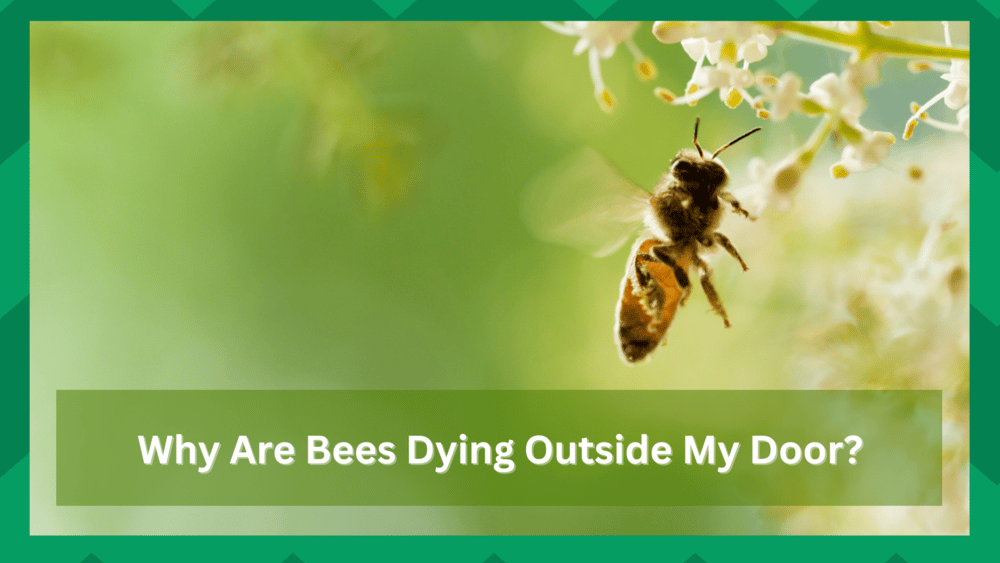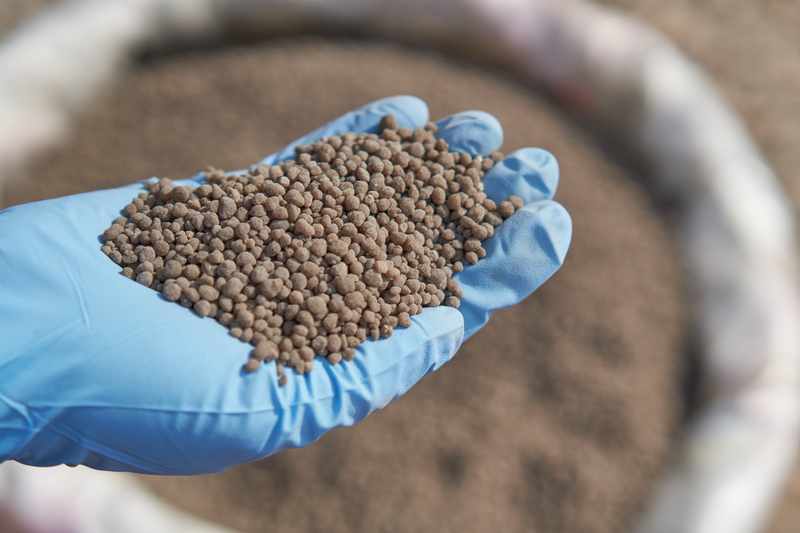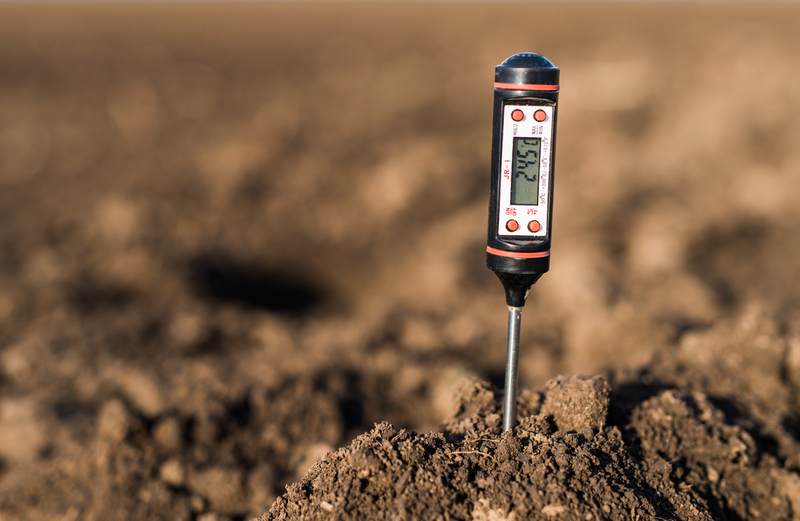
Bees are flying insects that might look insignificant and sometimes even annoying. But their role in this ecosystem is crucial to its survival.
Not only do they play an important role in pollination and getting us the food as we see it from the plants, but there is a lot more to them.
They are irreplaceable, and that is concerning if many bees end up dead outside your door. There can be several reasons why these bees are dying outside your door.
It is alarming if you are not having a bee infestation problem and have not taken any measures intentionally to get rid of the bees.
You will also need to take appropriate measures to fix that.
A few things you will need to be careful about if the bees are dying outside your door and to fix them up if you are concerned about pollination and are not having any problem with the bee infestation are mentioned below.
Why Are Bees Dying Outside My Door?
- Not Removing the Hive
If you have smoked some hives recently, you will also need to remove the hive from the place. It can be caused because the hive was not removed, and the smell has attracted all those bees. As a result, they don’t find the hive to be populated.
You will need to ensure that you are also removing the hive if you are smoking it to get rid of the bees, and that will help you not have any such issue with the bees dying outside your door.
- Hive Split
Hive split causes the bee swarm to travel. You will need to be careful about them moving to a certain location.
During travel, old and weak bees cannot keep up. They will die on the journey or at the doorstep.
These could be those older bees you are seeing at your door, and there is nothing you can do about it. Hive split is one of the major reasons for seeing too many bees dying at your door.
- Porch Lights
Porch lights are another major reason these bees die at your door. The lights that come on before dark become brighter as the sun sets.
That light is in the path of these bees to fly back to their hive before it gets dark. It can cause issues like bees losing their way home due to the light.
That’s because they are drawn toward it. They will fly and buzz around the light until they get tired. Since they will not be able to find their way toward the hive, you will have a certain number of bees dying at your door.
To avoid that, you should turn on the lights after the sun has set properly, and if there are some automated lights, you will need to program them accordingly. This will help you not to distract the bees from their path toward the hive.
- Diseases
There are diseases for these bees, which can also cause them to die out of nowhere.
If you find this a one-off instance, this can be due to some disease in the hive.
Dead bees are not going off easily due to disease, as the disease might be spreading across the hive or other hives. You will need to take appropriate measures to fix this up as well.
- Bee Fight
Bees also fight over the honey, usually between two different hives. If there is more than a single beehive around your home, then the dead bees you are seeing might be the casualties of a fight between the bees.
That is a natural phenomenon and has a common occurrence in winter. This is when honey is scarce, and there is little to do about it. The bees tend to steal honey from other hives and protect their own.
- Parasites and Pest
Bees are an essential part of our ecosystem; sadly, they are dying out in large numbers.
Studies have suggested that the main causes of bee deaths are parasites and pests, with potentially other factors such as climate change, habitat destruction, and human interference playing a role.
Parasites play a major role in why bees are dying. The most common parasite impacting bees is the Varroa destructor mite.
This small, eight-legged creature latches onto a bee and sucks out its blood, weakening it and making it more susceptible to other diseases and infections.
Another pest impacting bee populations is wax moths which feed on honeycomb cells and can lead to death due to the damage they cause.
Some various other parasites and pests can impact bee populations, such as bacterial or fungal infections, virus-carrying mosquitos, and even other species of bees that can compete for resources.
These all play a role in why bees are dying out.
It is important to understand why bees are dying to take the necessary steps to protect them.
This can be done by ensuring that there are enough bee-friendly habitats with plenty of nectar and pollen, as well as by reducing human interference in bee populations.
It is also essential to manage and control parasites and pests that harm bees so their numbers can continue to thrive.
- Poor Nutrition
Scientists have suggested multiple causes of bee death, but one of the most prominent theories is poor nutrition. Bees rely heavily on pollen and nectar from flowers to obtain essential nutrients and energy sources.
Unfortunately, many areas lack flower diversity due to land development or monoculture farming practices, limiting available food sources for bee populations.
This lack of variety can lead to nutritional deficiencies such as protein deficiency or Vitamin A deficiency which can cause serious health issues in bees, including decreased immune system function, impaired reproduction abilities, and increased susceptibility to diseases like Nosema ceranae.
Stress caused by overcrowded colonies or other environmental factors can further weaken their immune systems making them more susceptible to disease and ultimately leading to death if not addressed quickly enough.
- Excessive Moisture
Bees need dry conditions to survive, and too much moisture can damage their health or even be fatal. This could be due to wet weather patterns or other sources, such as irrigation systems in agricultural areas or water runoff from urban areas.
Too much moisture also affects bees’ food sources by killing off essential plants and flowers they rely on for nectar and pollen.
It can weaken the wax cells bees use for storing honey, leading to starvation if not addressed quickly enough. All these factors combined make excessive moisture an important factor in bee mortality rates worldwide.
So if you’re noticing a lot of bees dying outside your door, check for any signs of excessive moisture and take steps to reduce it. You’ll be helping the bees and other wildlife that depend on these resources!
How to prevent bees from dying?
The number of bees worldwide is declining, which has serious implications for many ecosystems. Pollinators like bees are essential for the health of plants and other animals, so it’s important to understand how we can help prevent their deaths.
Fortunately, everyone can take a few simple steps to ensure that our bee populations remain healthy and thriving.
Planting native flowers are one of the best ways to provide bee food sources. Native wildflowers contain more pollen than non-native species and require less maintenance since they’re adapted to local conditions.
You should avoid using pesticides or herbicides on your garden or lawn; these chemicals can be toxic to pollinators if not used correctly. Instead, opt for natural alternatives such as mulch or hand-weeding when possible.
Importantly, providing nesting sites by leaving bare patches of soil in your garden will give bees safe places to build nests and lay eggs which will help increase their population numbers over time.
By taking these simple steps, we can all contribute towards saving the world’s bee population from further decline.
Concluding Thoughts
In conclusion, bees are essential for the health of our planet and its ecosystems.
It is up to us as individuals to take steps towards protecting them from further decline by providing adequate nutrition sources through native plants, avoiding pesticides or herbicides in our gardens, and leaving bare patches of soil with nesting sites available.
By taking these simple measures, we can help ensure that bee populations remain healthy worldwide.
We must continue to stay vigilant regarding safeguarding pollinators like bees since they play an important role in sustaining life on Earth. So let’s all do what we can to protect this precious species!



